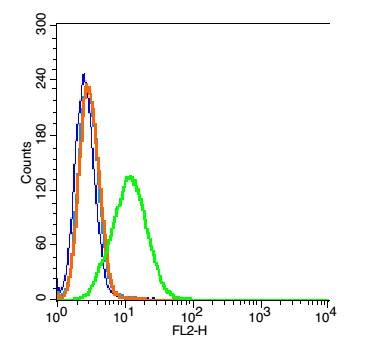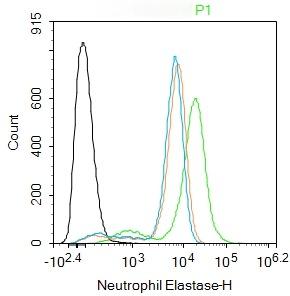Shopping Cart
Remove All Your shopping cart is currently empty
Your shopping cart is currently empty
Anti-ELANE Polyclonal Antibody 2 is a Rabbit antibody targeting ELANE. Anti-ELANE Polyclonal Antibody 2 can be used in FCM.
| Pack Size | Price | USA Warehouse | Global Warehouse | Quantity |
|---|---|---|---|---|
| 50 μL | $220 | 7-10 days | 7-10 days | |
| 100 μL | $374 | 7-10 days | 7-10 days | |
| 200 μL | $528 | 7-10 days | 7-10 days |
| Description | Anti-ELANE Polyclonal Antibody 2 is a Rabbit antibody targeting ELANE. Anti-ELANE Polyclonal Antibody 2 can be used in FCM. |
| Synonyms | PMN elastase, Neutrophil elastase, Medullasin, Human leukocyte elastase (HLE), Elastase-2, ELANE, ELA2, Bone marrow serine protease |
| Ig Type | IgG |
| Reactivity | Human (predicted:Mouse,Rat,Dog) |
| Verified Activity | 1. Blank control: A549 (blue), the cells were fixed with 2% paraformaldehyde (10 min) and then permeabilized with ice-cold 90% methanol for 30 min on ice. Isotype Control Antibody: Rabbit Igg (orange); Secondary Antibody: Goat anti-rabbit IgG-FITC (white blue), Dilution: 1:100 in 1 X PBS containing 0.5% BSA; Primary Antibody Dilution: 1 μL in 100 μL 1X PBS containing 0.5% BSA (green). 2. Blank control: THP-1. Primary Antibody (green line): Rabbit Anti-Neutrophil Elastase antibody (TMAB-00603) Dilution: 1 μg/10^6 cells; Isotype Control Antibody (orange line): Rabbit IgG. Secondary Antibody: Goat anti-rabbit IgG-FITC Dilution: 0.5 μg/test. Protocol The cells were fixed with 4% PFA (10 min at room temperature) and then permeabilized with 0.1% PBST for 20 min at room temperature. The cells were then incubated in 5% BSA to block non-specific protein-protein interactions for 30 min at room temperature. Cells stained with Primary Antibody for 30 min at room temperature. The secondary antibody used for 40 min at room temperature.   |
| Application | |
| Recommended Dose | FCM: 1μg/Test |
| Antibody Type | Polyclonal |
| Host Species | Rabbit |
| Tissue Specificity | Bone marrow cells. |
| Construction | Polyclonal Antibody |
| Purification | Protein A purified |
| Appearance | Liquid |
| Formulation | 0.01M TBS (pH7.4) with 1% BSA, 0.02% Proclin300 and 50% Glycerol. |
| Concentration | 1 mg/mL |
| Research Background | Elastases form a subfamily of serine proteases that hydrolyze many proteins in addition to elastin. Humans have six elastase genes which encode the structurally similar proteins. The product of this gene hydrolyzes proteins within specialized neutrophil lysosomes, called azurophil granules, as well as proteins of the extracellular matrix following the protein's release from activated neutrophils. The enzyme may play a role in degenerative and inflammatory diseases by its proteolysis of collagen-IV and elastin of the extracellular matrix. This protein degrades the outer membrane protein A (OmpA) of E. coli as well as the virulence factors of such bacteria as Shigella, Salmonella and Yersinia. Mutations in this gene are associated with cyclic neutropenia and severe congenital neutropenia (SCN). This gene is clustered with other serine protease gene family members, azurocidin 1 and proteinase 3 genes, at chromosome 19pter. All 3 genes are expressed coordinately and their protein products are packaged together into azurophil granules during neutrophil differentiation. [provided by RefSeq, May 2009]. |
| Immunogen | KLH conjugated synthetic peptide: human Neutrophil Elastase/ELANE |
| Antigen Species | Human |
| Gene Name | ELANE |
| Gene ID | |
| Protein Name | Neutrophil elastase |
| Uniprot ID | |
| Biology Area | Calcium Signaling,Elastin,Other Enzymes,Defensin,Angiogenic factors ELISA kits,Adhesion molecules ELISA kits,NK Cells,Macrophage / Inflamm.,Regulatory,Extracellular matrix |
| Function | Modifies the functions of natural killer cells, monocytes and granulocytes. Inhibits C5a-dependent neutrophil enzyme release and chemotaxis. |
| Molecular Weight | Theoretical: 26 kDa. |
| Stability & Storage | Store at -20°C or -80°C for 12 months. Avoid repeated freeze-thaw cycles. |
| Transport | Shipping with blue ice. |
| Size | Quantity | Unit Price | Amount | Operation |
|---|

Copyright © 2015-2026 TargetMol Chemicals Inc. All Rights Reserved.